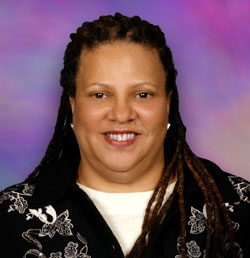Jacki Wilkins ’77 develops programs to make transportation more earth-friendly in Boston
By Benjamin Gleisser
 Jacki Wilkins ’77 traces her lifelong passion for ecology back to middle and high school, when she was a Girl Scout who enjoyed wilderness camping. She especially remembers camping on the beach and in the mountains, gazing up at a star-filled sky and feeling surrounded by nature’s beauty.
Jacki Wilkins ’77 traces her lifelong passion for ecology back to middle and high school, when she was a Girl Scout who enjoyed wilderness camping. She especially remembers camping on the beach and in the mountains, gazing up at a star-filled sky and feeling surrounded by nature’s beauty.
“The more I was exposed to nature, the more I began to appreciate it,” says the geology graduate, whose favorite pieces of jewelry are bracelets and earrings made of geodes. She also stays grounded through her collection of beach sands. “I’ve asked friends who travel to bring me back jars of sand from beaches around the world,” she adds with a laugh.
Today, ecological concerns remain Wilkins’ top priority. As a senior project manager for environmental permitting and planning for the Massachusetts Port Authority (Massport), her job involves helping to develop programs that make Boston’s Logan International Airport more earth-friendly.
Massport also oversees two regional airports, Tobin Bridge, and the Port of Boston.
Wilkins works with others at Massport on initiatives aimed at minimizing environmental impacts and reducing carbon emissions and energy consumption at Logan. The “green-friendly” measures, announced on Earth Day (April 22) 2007, include the CleanAir Cabs incentive program, which gives limited front-of-the-line privileges to taxis using hybrid fuels; designating prime parking spaces near garage elevators for vehicles that use hybrid and alternative fuels; encouraging airport access via transit options; and more.
Wilkins’ taxi incentive program dovetails with the City of Boston’s Clean Cabs initiative, which encourages taxi owners to replace older vehicles with more energy-efficient ones.
“Our initiative offers huge economic incentives for converting the city cab fleet to a green fleet,” she says. “Under the program, drivers of hybrid taxis are allowed two passes per shift to go to the front of the line. In addition, taxi stand signs encourage passengers to request hybrids, which will be dispatched if available, regardless of where they are in the queue. For hybrid taxi drivers, the added revenue, as well as the fuel savings from driving a hybrid, more than make up for the added purchase cost.”
She adds, “Massport is committed to developing plans to reduce energy consumption and greenhouse gases. Even in small ways, we’re trying to be good environmental stewards. ”
Wilkins also is president of the 400-member Boston chapter of the Women’s Transportation Seminar, which seeks to create leadership roles for women in the industry. She has influenced the focus of this international organization on sustainable mobility and was invited to speak at the 1st annual policy seminar on transportation and global warming in Washington, D.C., in September 2007. She also is a core organizer of Altwheels, a grassroots group that promotes alternate energy sources and sustainable modes of transport for individuals and for corporate and government fleets. Wilkins and her AltWheels cohorts are planning a symposium for fleet managers in September aimed at encouraging businesses and government agencies to use alternative fuels.
“I like how everything I do, in my work and in the associations I belong to, comes together synergistically,” says Wilkins, who participated in a panel discussion of sustainability at this year’s Council of Lafayette Women Conference. “I’m proud of my ability to influence people and get them to think about sustainability and environmental issues.”
When asked what drives her environmental zeal, she points to her two children.
“We’ve got to leave the Earth in better shape than what we were given,” she says. “Having children is the most important reason to care about the future. Our planet is our legacy for future generations.”
 Jacki Wilkins ’77 traces her lifelong passion for ecology back to middle and high school, when she was a Girl Scout who enjoyed wilderness camping. She especially remembers camping on the beach and in the mountains, gazing up at a star-filled sky and feeling surrounded by nature’s beauty.
Jacki Wilkins ’77 traces her lifelong passion for ecology back to middle and high school, when she was a Girl Scout who enjoyed wilderness camping. She especially remembers camping on the beach and in the mountains, gazing up at a star-filled sky and feeling surrounded by nature’s beauty.